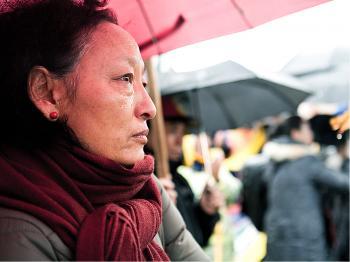NEW YORK—Tibetan exiles congregated en masse in cities all over the world on Thursday, the anniversary of the 1959 Tibetan uprising, to protest the continued oppression they experience at the hands of the Chinese Communist Party (CCP). As the call for a free Tibet resounded worldwide, Tibet’s leader, the 75-year-old Dalai Lama, announced he was abdicating his political role.
“This announcement is sort of a formality,” said Tenzin Dorjee, executive director of Students for a Free Tibet, an international organization based in New York. “The Dalai Lama has been working on this process for a long time, [the process of] devolving political power to the Tibetan people,” explained Dorjee as he stood among hundreds of Tibetans gathered near the United Nations headquarters in New York.
The Tibetan prime minister used to be appointed by the Dalai Lama. In 2001, the first elected prime minister took office in Dharamsala, India, home to the government-in-exile. The Dalai Lama remained the titular head of state, but noted in his statement Thursday morning, “I have repeatedly stressed that Tibetans need a leader, elected freely by the Tibetan people, to whom I can devolve power.”
The revered leader assured his people, “My desire to devolve authority has nothing to do with a wish to shirk responsibility. It is to benefit Tibetans in the long run. It is not because I feel disheartened.”
Nor were many of the Tibetans in New York disheartened by their leader’s abdication. “The Tibetan people don’t need to worry, because the Dalai Lama will continue to be a symbol of strength,” said Dorjee.
“His heart and mind is for the people of Tibet,” said Tsering Sangp Gaga, president of the Tibetan Community of New York and New Jersey. Gaga is confident that whatever the Dalai Lama decides, will be what’s best for Tibet.
Gaga is registered to vote in elections for the Tibetan government-in-exile, which will take place March 20. He says 2,300 of the approximately 10,000 Tibetans in New York are registered as well.
According to Students for a Free Tibet, about 150,000 Tibetans are currently in exile. The majority is in India and Nepal, but many are also found in the United States, Canada, and Europe.
Gaga’s message for his countrymen back in Tibet and in the diaspora is, “no matter what, our struggle must continue and truth will prevail.”
Read More . . . Dalai Lama’s Thoughts
[etssp 256]
Dalai Lama’s Assessment of Current Situation in Tibet
The Dalai Lama says the truth is hard to find in the China.
“If citizens are fully informed, they have the ability to distinguish right from wrong. Censorship and the restriction of information violate basic human decency,” stated the Dalai Lama in his announcement on Thursday.
He urged the Chinese regime to release prisoners of conscience: the many journalists, intellectuals, and public figures who have stepped forward in ever-increasing numbers to call for reform and openness. He pointed out that the very nature of the communist regime remains shrouded in mystery and obscurity to those under its rule.
“China’s leaders consider the communist ideology and its policies to be correct. If this were so, these policies should be made public with confidence and open to scrutiny,” declared the Dalai Lama.





